#Standard Film Company
Explore tagged Tumblr posts
Text
All-Time Favorite Trailers: 'Little Children'
A lot of movie trailers are scored with certain kinds of music to where certain themes are used over and over in them such as the ones from “Black Rain” and “Requiem for a Dream.” But for the “Little Children” trailer, however, the images we see are instead scored to the sound of a locomotive train which is about to reach its desired destination, and it proves to be the perfect illustration of…
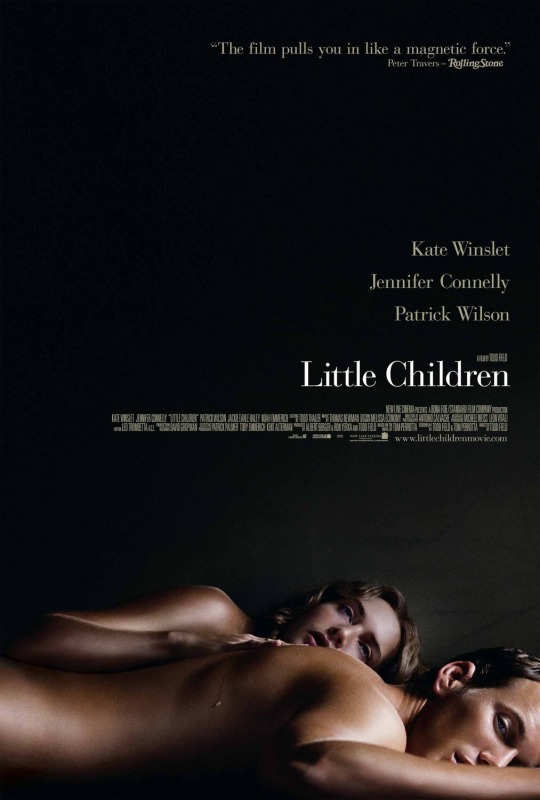
View On WordPress
#2006 Movies#Bona Fide#Book To Film#Gregg Edelman#Jackie Earle Haley#Jennifer Connelly#Kate Winslet#Little Children#Movie Trailers#New Line Cinema#Noah Emmerich#Patrick Wilson#Phyllis Somerville#Standard Film Company#Todd Field#Tom Perrotta
6 notes
·
View notes
Text
So I went to the wiki page for the henghill Bullet & Brain mission of 2.2 looking for some dialogue I had missed and
a) I found something incredibly tasty that slotted into some other thoughts I'd been having, more on that on another day, and
b) I saw this super fun little trivia at the bottom, which!
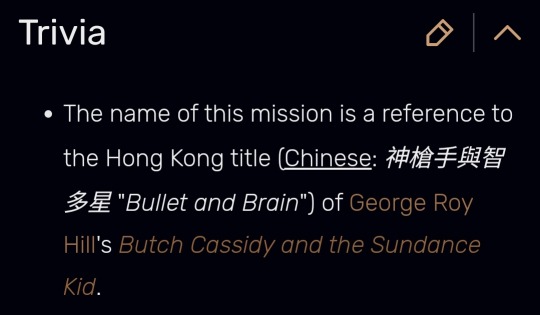
I knew Penacony characters like Boothill took a lot of inspirations from old movies, but I didn't realize it was even in his and Dan Heng's relationship, that's so cool!!
It fits them very well, it's such a fun reference. "Butch Cassidy and the Sundance Kid" was an old buddy Western film (from 1969- nice) about a pair of outlaws. Butch Cassidy was the leader of a gang, and described as clever, affable, and talkative. Meanwhile, his closest companion, the Sundance Kid, was known as a man of few words.
Cassidy's original birth name was much more plain, but similar to Boothill, he took on a new moniker when he became an outlaw. "Cassidy" had been the last name of his beloved mentor, who taught him how to shoot and ride. And Sundance Kid was known as he was because Sundance was the name of his hometown, and it was the only place that had ever managed to catch and jail him, back when he'd been younger (also similar to Dan Heng, but ouch).
These two stick together like glue throughout the length of the film- through Cassidy's leadership of the gang being challenged, through a train robbery gone wrong, through being pursued by mercenaries, and even through fleeing to Bolivia and trying to start over together.
I don't want to say too much more, since the mission title is referencing one specific movie that I've never seen. I kinda wanna watch it now, though, just to see the inspiration that went into Boothill and Dan Heng and how they get along. I just think it's really sweet that these two were literally made to be the best of bros, how lovely is that. 💕
#honkai star rail#this can be ship or plantonic tbh yall are always free to tag my ramblings as you please haha#just! they're so sweet!!#FWENDS#i would love to see more of them being a dynamic duo further down the line ♡#i think the film moved things along a little quicker but the real life Cassidy and Sundance were actually in south america for a few years#they fled there to get away from pursuers along with Sundance's girlfriend Etta Place.#supposedly they managed to buy a small ranch and the three of them lived peacefully (and even lawfully!) together for like three years-#-until the law caught up with them again#at some point Etta Place returned to the US reportedly due to illness rather than not wanting to get caught like in the film#Sundance may or may not have escorted her back. but whether he did or not he returned to South America with Cassidy#the two of them eventually got into a huge firefight with authorities where Sundance was fatally shot and Cassidy chose to end his own life#that's the most common story anyway. some also say Cassidy snuck back into the US again where he lived quietly until his death.#but it reads kind of like rumors of Elvis Presley sightings to me BSMZKNSKS#the film ended much more happily with the two of them getting into shenanigans and a freeze frame of them in a hail of bullets haha#i wanna see Dan Heng and Boothill fight together too it would be so cool aaaaaa#they would be great at getting into shenanigans! as we've already seen!!#fun bonus info: Boothill's ult literally puts black bars at the top and bottom of the screen to look like a widescreen Western movie#fun bonus info 2: Cassidy was regarded with respect by some people bc he never stole from the poor he only robbed big companies#this is actually nicer than Boothill is in canon bc he openly admits he will rob someone blind if he doesn't like them BSKZKKZMSKDK#(although I feel like its implied he has more standards for this than he gives himself credit for.#like he makes it pretty clear he doesn't particularly like Argenti at first and thinks he's annoying as shit but I'm sure he didn't rob him#...would have been real fucking funny if he did though oh my god I would love to see him try that. it absolutely would not work BSKZKNSKSJS#hsr#henghill#bootheng#dan heng#boothill#hsr boothill#hsr dan heng
48 notes
·
View notes
Text
oh wow our dear marketing team decided to post a snippet from my recruiting ad as a reel on instagram :|
#i curse the day i agreed to do film it#also its by far the most viewed post on our company profile#350+ views vs the standard 80 lol#diary of a gay slav
4 notes
·
View notes
Text
I just got my first email ever from someone who found me through the state film crew directory looking for a production assistant,,,
#i cant find any details on the producer's name or the production company so i AM gonna ask for more before i agree to anything but 👀👀👀#the offered rate seems like its like.. standard for four days of filming though. at least for a small indie production
4 notes
·
View notes
Text
The more I learn about labour law the more I wish I knew nothing tbh
#last night i read abt i forgot the name#the states that can fire u at any time#thats so wild#i live in a place that is the opposite i think its called just cause#but realistically they play so dirty#company tried to fire my coworker for being “non-presentable” *cough* not fitting their besuty standards#and slso basically for being poor#completely illegal here but they will do it bc they think theyre above the law#i had an outburt during my break where i was ranting abt this new material they sent us last minute being stupid#knowing there was a mic in the room#idk we will see if they fire me#its not a just cause tho bc 1. i was on break#2. its illegal to film/record staff ESPECIALLY on break#3. i never signed a waiver consenting to that and#4. even talking smack about the company isnt just grounds as long as its not to the clients#i hate working
0 notes
Text
There's a movie coming out fairly soon called September 5. It's a dramatic retelling of the hostage taking and massacre of the Israeli Olympic team in Munich in 1972, told from the perspective of the ABC sports journalists who had to make the decision to air the event live to the United States as part of their Olympic coverage.
The movie has gotten... fairly middling press? Reviews I've seen say that it's pretty bog standard as historical action/thriller movies go. I, as a Jew, take some umbrage with having the PoV of a recent traumatic event in Israeli-Jewish history be that of the unaffected goyim on the sidelines, but... eh, fine. If it's a story told well, then gei gezunte heit.
I bring this up because the staff of the NYC location of Alamo Drafthouse - a US movie theater chain that I can only really describe as "the Trader Joe's of cinema" (in that it purports to have a better customer experience and support more out there projects) is trying to cancel screenings of September 5, calling it "Zionist propaganda" because, according to their petition:

So right off the rip, they call the Munich massacre by Black September's name for the plan, Operation Iqrit and Biram. This signals to the reader that they believe the massacre to have been a legitimate military operation, rather than what it was - the kidnapping and wanton murder of civilian athletes in the middle of the Olympic games. The rest of the paragraph is the same asinine drivel about how this is obviously Western propaganda and how portraying Black September as evil, antisemitic terrorists (which, by the way, they were, by dint of the fact that they kidnapped and murdered Israeli Olympic athletes at the Olympic games), and they plan to bring this petition to their union meeting later this month.
I spent the last few paragraphs writing about this because I'm disappointed. I've been to that Alamo Drafthouse, and I support the company's ideals of bringing less mainstream cinema into the greater fold, and having cool and interesting showings of popular movies. And now I probably can't go back there, ever, because even if Alamo Drafthouse dismisses the workers' petition and shows the movie anyways, I'll never feel comfortable supporting an institution that can see the existence of a film where terrorists kill my people and cry that it's propaganda by the victims.
817 notes
·
View notes
Text

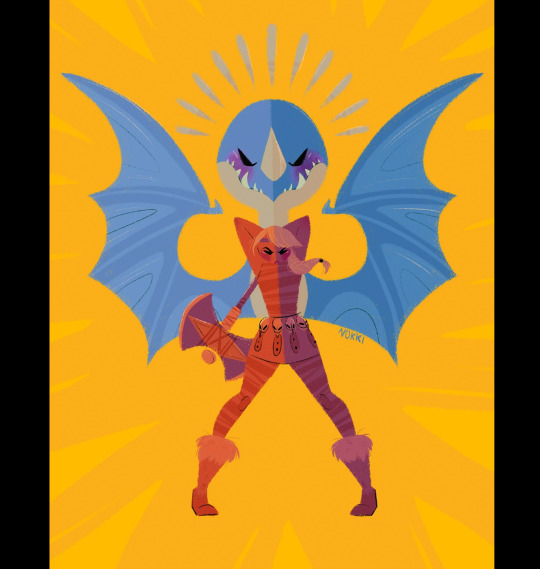
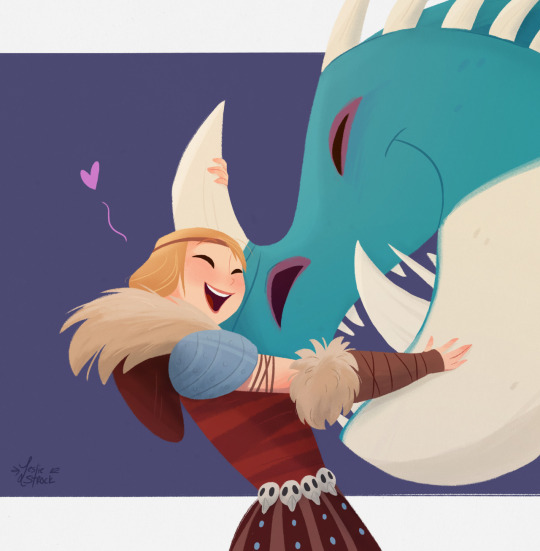
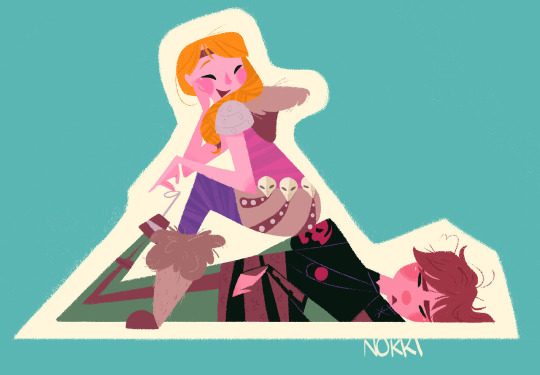
As a long time httyd fan who has been heavily involved in the fandom since the first movie and who has spent years working in the animation industry, I’d like to share my thoughts on the new httyd movie. Keep in mind, this is just my personal opinion and it's completely fine if you disagree with me. I just want to say a little something about all this that really bothers me.
The core reason that Dreamworks and Universal made this film is that it’s a quick and easy cash grab for them. Thats it. They don’t care about telling a good story or making a “better” version of the original movie for fans or even having an accurate portrayal of the characters/story. It’s purely about money. They know that fans of the original film will go see this movie, whether it’s good or bad. And those guaranteed ticket sales are all that matter to the studios. And with Universal, it has the added bonus of being a cheap promotional and merchandising opportunity for the new HTTYD land in Orlando that opens around the same time that the film is premiering in theaters.
And to help the studios make even more money out of this, they are using non-unionized VFX companies around the world to make this film, so that they can get cheaper labor and push the artists to do more that would be against American union standards. The same thing has probably happened with the costuming and fabrication for the filming, hence why the costumes look un-weathered and the sets look cheap. They don’t want to pay for the extra time and effort that it would take to make the practical bits of the production look good.
On top of all this, Dreamworks has already announced that they’re shutting down all their in-house animation projects in favor of using AI and outsourcing projects to cheaper international non-union studios.
With all this in mind, I just can’t support this film and I will not be seeing it in theaters. And I hope that others will do the same.
The only way to stop all these horrible “live action” remakes (which are actually just realistically animated remakes) is to not buy tickets to see them. Money is all that matters to these studios, and if they don’t make any money off of it, then they will stop and try something different. Maybe they'll even go back to focusing on original stories!
That’s the power that we hold as audiences. Our wallets help drive the decisions that the executives make. So support unique storytelling and gorgeous cinematography in movies. Support indie films. Support animators as they're fighting for fair pay and better contracts. But don't support a mediocre shot-for-shot remake riding on the coattails of an already successful film.
And I just want to wrap all this up by saying I have absolutely no hate towards anyone that has worked on the new film. Toothless looks incredible and I know the artists and creatives involved in this project did the best they could with what they were given.
But I also know that those same artists have so many more brilliant ideas that they would’ve loved to be given the creative freedom to do. I just wish hollywood would be willing to take a chance and let them do it.
#they could've made a film following the plot of the httyd books or even a different pov of what happened in Berk from a vikings view#those would've been much better options if they really wanted to utilize this IP in a live action or realistic animation format#but they chose the cheap option of literally copying an already successful film and throwing actors in there to say its new and different#this whole thing bugs me so much#i hope you guys will excuse this rant but I hate what hollywood has become and I hate that creatives are forced to make this junk for them#all while fearing for their jobs because of rampant layoffs#please help put an end to hollywood abusing creatives in the way that they are and don't watch this movie#httyd#how to train your dragon#hiccup#toothless#movie#live action#dragon#astrid#stormfly#cosplay#art#artists on tumblr
638 notes
·
View notes
Text
Harpercollins wants authors to sign away AI training rights

If you'd like an essay-formatted version of this post to read or share, here's a link to it on pluralistic.net, my surveillance-free, ad-free, tracker-free blog:
https://pluralistic.net/2024/11/18/rights-without-power/#careful-what-you-wish-for

Rights don't give you power. People with power can claim rights. Giving a "right" to someone powerless just transfers it to someone more powerful than them. Nowhere is this more visible than in copyright fights, where creative workers are given new rights that are immediately hoovered up by their bosses.
It's not clear whether copyright gives anyone the right to control whether their work is used to train an AI model. It's very common for people (including high ranking officials in entertainment companies, and practicing lawyers who don't practice IP law) to overestimate their understanding of copyright in general, and their knowledge of fair use in particular.
Here's a hint: any time someone says "X can never be fair use," they are wrong and don't know what they're talking about (same goes for "X is always fair use"). Likewise, anyone who says, "Fair use is assessed solely by considering the 'four factors.'" That is your iron-clad sign that the speaker does not understand fair use:
https://pluralistic.net/2024/06/27/nuke-first/#ask-questions-never
But let's say for the sake of argument that training a model on someone's work is a copyright violation, and so training is a licensable activity, and AI companies must get permission from rightsholders before they use their copyrighted works to train a model.
Even if that's not how copyright works today, it's how things could work. No one came down off a mountain with two stone tablets bearing the text of 17 USC chiseled in very, very tiny writing. We totally overhauled copyright in 1976, and again in 1998. There've been several smaller alterations since.
We could easily write a new law that requires licensing for AI training, and it's not hard to imagine that happening, given the current confluence of interests among creative workers (who are worried about AI pitchmen's proclaimed intention to destroy their livelihoods) and entertainment companies (who are suing many AI companies).
Creative workers are an essential element of that coalition. Without those workers as moral standard-bearers, it's hard to imagine the cause getting much traction. No one seriously believes that entertainment execs like Warner CEO David Zaslav actually cares about creative works – this is a guy who happily deletes every copy of an unreleased major film that had superb early notices because it would be worth infinitesimally more as a tax-break than as a work of art:
https://collider.com/coyote-vs-acme-david-zaslav-never-seen/
The activists in this coalition commonly call it "anti AI." But is it? Does David Zaslav – or any of the entertainment execs who are suing AI companies – want to prevent gen AI models from being used in the production of their products? No way – these guys love AI. Zaslav and his fellow movie execs held out against screenwriters demanding control over AI in the writers' room for 148 days, and locked out their actors for another 118 days over the use of AI to replace actors. Studio execs forfeited at least $5 billion in a bid to insist on their right to use AI against workers:
https://sites.lsa.umich.edu/mje/2023/12/06/a-deep-dive-into-the-economic-ripples-of-the-hollywood-strike/
Entertainment businesses love the idea of replacing their workers with AI. Now, that doesn't mean that AI can replace workers: just because your boss can be sold an AI to do your job, it doesn't mean that the AI he buys can actually do your job:
https://pluralistic.net/2024/07/25/accountability-sinks/#work-harder-not-smarter
So if we get the right to refuse to allow our work to be used to train a model, the "anti AI" coalition will fracture. Workers will (broadly) want to exercise that right to prevent AI models from being trained at all, while our bosses will want to exercise that right to be sure that they're paid for AI training, and that they can steer production of the resulting model to maximize the number of workers than can fire after it's done.
Hypothetically, creative workers could simply say to our bosses, "We will not sell you this right to authorize or refuse AI training that Congress just gave us." But our bosses will then say, "Fine, you're fired. We won't hire you for this movie, or record your album, or publish your book."
Given that there are only five major publishers, four major studios, three major labels, two ad-tech companies and one company that controls the whole ebook and audiobook market, a refusal to deal on the part of a small handful of firms effectively dooms you to obscurity.
As Rebecca Giblin and I write in our 2022 book Chokepoint Capitalism, giving more rights to a creative worker who has no bargaining power is like giving your bullied schoolkid more lunch money. No matter how much lunch money you give that kid, the bullies will take it and your kid will remain hungry. To get your kid lunch, you have to clear the bullies away from the gate. You need to make a structural change:
https://chokepointcapitalism.com/
Or, put another way: people with power can claim rights. But giving powerless people more rights doesn't make them powerful – it just transfers those rights to the people they bargain against.
Or, put a third way: "just because you're on their side, it doesn't follow that they're on your side" (h/t Teresa Nielsen Hayden):
https://pluralistic.net/2024/10/19/gander-sauce/#just-because-youre-on-their-side-it-doesnt-mean-theyre-on-your-side
Last month, Penguin Random House, the largest publisher in the history of human civilization, started including a copyright notice in its books advising all comers that they would not permit AI training with the material between the covers:
https://pluralistic.net/2024/10/19/gander-sauce/#just-because-youre-on-their-side-it-doesnt-mean-theyre-on-your-side
At the time, people who don't like AI were very excited about this, even though it was – at the utmost – a purely theatrical gesture. After all, if AI training isn't fair use, then you don't need a notice to turn it into a copyright infringement. If AI training is fair use, it remains fair use even if you add some text to the copyright notice.
But far more important was the fact that the less that Penguin Random House pays its authors, the more it can pay its shareholders and executives. PRH didn't say it wouldn't sell the right to train a model to an AI company – they only said that an AI company that wanted to train a model on its books would have to pay PRH first. In other words, just because you're on their side, it doesn't follow that they're on your side.
When I wrote about PRH and its AI warning, I mentioned that I had personally seen one of the big five publishers hold up a book because a creator demanded a clause in their contract saying their work wouldn't be used to train an AI.
There's a good reason you'd want this in your contract; the standard contracting language contains bizarrely overreaching language seeking "rights in all media now know and yet to be devised throughout the universe":
https://pluralistic.net/2022/06/19/reasonable-agreement/
But the publisher flat-out refused, and the creator fought and fought, and in the end, it became clear that this was a take-it-or-leave-it situation: the publisher would not include a "no AI training" clause in the contract.
One of the big five publishers is Rupert Murdoch's Harpercollins. Murdoch is famously of the opinion that any kind of indexing or archiving of the work he publishes must require a license. He even demanded to be paid to have his newspapers indexed by search engines:
https://www.inquisitr.com/46786/epic-win-news-corp-likely-to-remove-content-from-google
No surprise, then, that Murdoch sued an AI company over training on Newscorp content:
https://www.theguardian.com/technology/2024/oct/25/unjust-threat-murdoch-and-artists-align-in-fight-over-ai-content-scraping
But Rupert Murdoch doesn't oppose the material he publishes from being used in AI training, nor is he opposed to the creation and use of models. Murdoch's Harpercollins is now pressuring its authors to sign away their rights to have their works used to train an AI model:
https://bsky.app/profile/kibblesmith.com/post/3laz4ryav3k2w
The deal is not negotiable, and the email demanding that authors opt into it warns that AI might make writers obsolete (remember, even if AI can't do your job, an AI salesman can convince Rupert Murdoch – who is insatiably horny for not paying writers – that an AI is capable of doing your job):
https://www.avclub.com/harpercollins-selling-books-to-ai-language-training
And it's not hard to see why an AI company might want this; after all, if they can lock in an exclusive deal to train a model on Harpercollins' back catalog, their products will exclusively enjoy whatever advantage is to be had in that corpus.
In just a month, we've gone from "publishers won't promise not to train a model on your work" to "publishers are letting an AI company train a model on your work, but will pay you a nonnegotiable pittance for your work." The next step is likely to be, "publishers require you to sign away the right to train a model on your work."
The right to decide who can train a model on your work does you no good unless it comes with the power to exercise that right.
Rather than campaigning for the right to decide who can train a model on our work, we should be campaigning for the power to decide what terms we contract under. The Writers Guild spent 148 days on the picket line, a remarkable show of solidarity.
But the Guild's real achievement was in securing the right to unionize at all – to create a sectoral bargaining unit that could represent all the writers, writing for all the studios. The achievements of our labor forebears, in the teeth of ruthless armed resistance, resulted in the legalization and formalization of unions. Never forget that the unions that exist today were criminal enterprises once upon a time, and the only reason they exist is because people risked prison, violence and murder to organize when doing so was a crime:
https://pluralistic.net/2024/11/11/rip-jane-mcalevey/#organize
The fights were worth fighting. The screenwriters comprehensively won the right to control AI in the writers' room, because they had power:
https://pluralistic.net/2023/10/01/how-the-writers-guild-sunk-ais-ship/

Image: Cryteria (modified) https://commons.wikimedia.org/wiki/File:HAL9000.svg
CC BY 3.0 https://creativecommons.org/licenses/by/3.0/deed.en
--
Eva Rinaldi (modified) https://commons.wikimedia.org/wiki/File:Rupert_Murdoch_-_Flickr_-_Eva_Rinaldi_Celebrity_and_Live_Music_Photographer.jpg
CC BY-SA 2.0 https://creativecommons.org/licenses/by-sa/2.0/deed.en
#pluralistic#harpercollins#newscorp#rupert murdoch#chokepoint capitalism#publishing#books#big publishing#ai#copyright#copyfight
442 notes
·
View notes
Text
The Barbie Movie is confused -- and it is confused on purpose, because it can't actually acknowledge the role that capitalism and white supremacy play in the patriarchal system that it wants to give itself credit for acknowledging. And so the film introduces patriarchy as a force with no agent or system behind it.
Ken, an oafish goof is able to find the concept of patriarchy and transmit it to the entirety of his society simply by learning about it and speaking about it to his fellow Kens. There is no use of force, no political organizing (notably, the Kens try to take over the political system after they have already taken hold of the culture), no real persuasion even -- simply by hearing about patriarchy the women in Barbieworld somehow become brainwashed by it.
This means we never have to really see the Kens as genuine antagonists, we can still laugh at their bizarrely crammed-together multiple dance numbers and forgive them when they, like the women, are freed of the patriarchy simply by women speaking about the fact that sexism exists. Both the origins of patriarchy and the solution to it is as simple as an individual person telling their story.
The CEOs that run Mattel in the Real World in the film are similarly cartoonish and devoid of real agency. They're even portrayed as generically interested in the idea of Barbie being inspiring to girls. The movie can't even acknowledge their profit motive, and it can't make any of the men running the company look too powerful or even too morally suspect -- but the film does still want to have Barbie encounter sexism in the real world and grapple with the harm "she" (the consumer product, and not the social forces and human beings that created her) has supposedly done.
In the Barbie Movie, patriarchy is a genie in a bottle, and no one is to blame - except maybe Barbie herself, since the movie spends a significant amount of time discussing how she is responsible for giving women unrealistic beauty standards.
And so Barbie is depicted as both sexism's victim and sexism's fault. She's dropped into a patriarchal world that the film acknowledges has a menacing, condescending quality -- but the film can't even have an underlying working theory of where this danger comes from, and who had the power to create this patriarchy in the first place, because that would require being critical of Mattel and capitalism.
And in the film, ultimately the real world with all its flaws and losses and injustices is still preferable to Barbieworld, because you get to have such depth of feeling and experience and you get a vagina, so how bad could really be? And hey, when you think about it, the Barbieworld is just an inversion of the real world, isn't it? A world with women in power is just reverse sexist, so it was justifiable for the Kens to want to take over, and what does it say that all things being equal Barbie still would prefer to leave behind her matriarchy and join the patriarchal capitalist world? That's the real world. Real world is struggle and sexism and loss and pain and capitalism and death and we must accept all of it but it's worth it..
It's not that I'm surprised the film's a clarion call for personal choice white feminism and consumer capitalism. I just expected the call to be a little more seductive or in any way coherent. I wanted to have frothy fun, and instead I was more horrified by the transparency of its manipulation than I was by even the most unsettling moments in Oppenheimer.
4K notes
·
View notes
Note
Why are people mad at the barbie promo?
it's not a standard promotional cycle for a film that happens to involve mattel's famous toy. it is a massive brand push to revitalize a product for a new age, and the movie is the commercial. it is not normal to have promotion that includes collaborations with: airbnb, hair tools, many makeup companies, rollerskates, forever21, canned lemonade, ruggable, toothburshes, skincare, shoe lines, gap, pacsun, OPI etc etc etc............... like i'm going to go see the movie! it will in all likelihood be fun and enjoyable. but this rollout is explicitly mattel's first phase in what they hope is a HUGE endeavor to make "cinema" out of every one of their products, as a way to get more people to buy these products. regardless of how the barbie movie turns out, it is not actually good for anyone to have a failing film industry turn to self-cannibalizing commercial products for story. i hope everyone has a good time! i don't give a fuck if you want to buy a hot pink dress and go with your girlfriends and revel in your #womanhood or whatever. but the degree to which mattel has already had input in the actual movie + made people think that their massive push of product is some sort of cool innovative trendy Promotion (while having plans to do this to. 45 other producuts) is like. lol oh boy.
#like who cares no one is going to yell boo at you and rip your fun barbie branded stuff out of your hands#but don't pretend it's like.#cool and new fun marketing for a regular ole movie#if you factor this in with the current state of the Movies.... bruh. el oh el!!!!!!#so like do whatever you want to do but don't act like people critiquing the rollout are like#antifeminist or something for pointing out some#um. troubling details
4K notes
·
View notes
Text
Reminder that Disney actively supports and is complicit with genocide of Palestinians by donating aid to Israel after Oct 7th, but continuing to ignore Palestinians and their overwhelmingly larger amount of deaths and NEED for aid, basically delegitimizing their suffering.
They also still haven’t scrapped any plans to removed Sabra, an already controversial Israeli “superhero” from the next MCU film.
All because they want that 🇮🇱🇺🇸💰💰💵

Palestinians are counting on people to avoid these companies as much as we can.
If you aren’t going to talk about it, at least show that you care about human life by not buying their new merch or posting about it/promoting it.
You know who I am and how obsessed I am with this merchandise, so if I’M able to stop YOU literally have no excuse other than you don’t care about people dying & being erased while Disney has its double standards of only helping white Europeans with cash, but ignoring Arabs and people of color.
1K notes
·
View notes
Text
WHAT WE CLUE IN THE SHADOWS: A FINALE CONSPIRACY BOARD
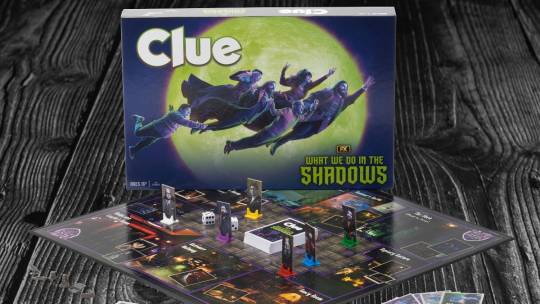
So. WWDITS may have the actual balls to do this to us. and I for one am INCREDIBLY excited for the possibility. If you're a WWDITS fan and haven't seen Clue (1985), I highly recommend taking 95 minutes to do so before the finale. Just in case.
Clue is my favorite movie, I have probably seen it upwards of 100 times for real, and I can recite it from memory with 90% accuracy. I also have the pleasure of owning and playing the WWDITS-themed Clue game, which is centered around finding out who stole the witch's skin hat and where in the house they hid it. I don't know if that will play into the finale at all, but it's something to think about.
The thing about Clue (the film), if you aren't aware, is that there are three different endings. On the vhs/dvd, you see all three in a row between 'that's how it could have happened, but what about this?' title cards. In theaters, there were three versions of the movie (labeled A, B, and C) that were dispersed to different theaters, so depending on where and when you went to see it you would see one of 3 endings. (It's kinda unclear which letter corresponded to which originally, so my labels will be assuming a 1:1 comparison between the order of the home version of Clue and the airing order of the WWDITS episodes.) The Clue endings are not all made equal, and on the home version, the final ending is announced as 'what really happened.'
So allow me to take a moment to talk about how the different endings work in context to each other and the film, and how that could translate to three different endings for WWDITS.
CLUE SPOILERS UNDER THE CUT (for real, go watch it)
(last chance to watch Clue go)
Ending#1: "Communism is just a red herring"

In this ending, the first one that plays in the home version, Miss Scarlet is revealed to be the murderer. She is a snarky, sarcastic madam who runs a "hotel and telephone service to provide men with the company of a young lady for a short while" and has policemen on her payroll. This is what I would consider the expected ending, the one that makes sense for most viewers. It's not shocking, but it's funny and well acted and it makes the most sense. Miss Scarlet has the right personality for murder, was in the most convenient area of the house to commit them, and had Yvette (the maid, formerly one of Miss Scarlet's call girls) committing some of the murders at her direction, so she had enough alibis to not make her too obvious. Many people watching this movie for the first time will have her high on their suspect list.
This ending also dismisses the idea of 'dangerous communism' that had been a thread throughout the film (as it is set in 1953 during the second Red Scare) as a misdirection. Miss Scarlet isn't stealing government secrets to betray the US; she's doing it to make money. The real danger all along was capitalism, something that s6 of WWDITS has said repeatedly.
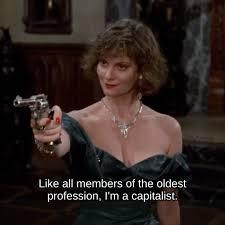
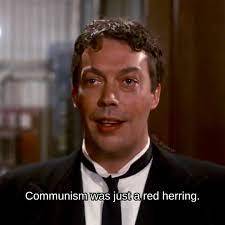
So, to recap, this is the Standard Ending. The Second Best ending. Version B.

Ending #2: "Mrs. Peacock did it all."

This one, played second in the home version, is in my opinion the weakest ending. It reveals Mrs. Peacock, the neurotic, hysterical, and allegedly politically corrupt wife of a senator, as the murderer. She's hilarious and fantastic to watch throughout the whole film and I love her, but this charm drops after the reveal and she becomes cold and drab as she threatens her way to safety. She committed all the murders herself, which would be very difficult to achieve with the tight timing and her position in the basement during the search.
She ends up being caught outside the house by a police inspector, who had earlier shown up disguised as an evangelist telling her to "repent, the kingdom of heaven is at hand." Interestingly, they originally filmed him immediately shooting her dead without provocation, but they thought that was too dark and edited it into an arrest instead (which is why there is such a quick cut after he pulls his gun, and we only hear her rather than see her after that). This is the 'repent for your sins' ending. You do bad things, bad things happen to you.

The obligatory "it's always who you least expect" ending. The Still-Good-But-Not-The-Best Ending. Version C.

Ending #3: "You're Mr. Boddy!"

This is "how it really happened" - the twist ending! The hero was the villain, the villain was just a pawn, and everyone committed a murder in the house to cover their own asses. Prof Plum killed the fake Mr. Boddy, Miss Scarlet killed the cop, Mrs. Peacock killed Mrs. Ho (the cook), Mrs. White killed Yvette, Colonel Mustard killed the motorist, and Wadsworth/Mr. Boddy killed the singing telegram girl.
Mr. Green, who reveals he works for the FBI, kills Wadsworth/Mr. Boddy and arrests the rest of the cast. Understandably the best and most exciting ending (though not without some plot holes) that everyone loves. We get a surprising reveal from two of our main characters that not only changes the context with how you view them, but informs aspects of their character that have been there throughout the film! Now we understand why Wadsworth retained control of the house and the timeline of events, why he was so familiar with the house, and why this entire thing was orchestrated in the first place. We also understand why the cowardly and clumsy Mr. Green was consistently the first to jump to help and defend the other characters, even when it meant putting himself if physical danger. Unfortunately this ending also suggests that he was only pretending to be gay (wouldn't that be a twist for Guillermo lol), but he could also just be in a lavender marriage which is what I choose to believe.
This ending also has the iconic 'flames on the side of my face' scene and repeats 'communism is a red herring', this time in the context of Mr. Boddy's intention to continue blackmailing them all now that they have taken care of anyone who could have pointed the finger at him.
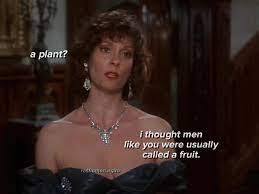

This is the True Ending. The twist you didn't expect but are delighted to find. The 'nothing was as it seemed' endng. The ending that is the most intentional and complete, where everyone gets to shine. Version A.

So what will we be doing in those shadows?
We can assume that e11 will not revolve around finding a murderer, but it does, from what we've seen in the trailer, revolve around making a wife for the monster. Do we get three different wives? Three different actors to play her? Three different superhero identities for Nandor and Guillermo? Three different levels of nandermo: one with a handshake, one with a hug, one with a kiss? Three different explanations for the origin and/or purpose of the documentary? (this is my personal favorite) Or is each ending entirely divorced from the other? Only time will tell.
What I'm leaning toward is that each episode will come up to the same turning point - a decision, a reveal, etc. The first two versions will have reasonable possibilities, the first less surprising but more enjoyable than the second, and the third... The third will be what really happened, and pull a twist no one saw coming. Perhaps even a character will reveal a hidden identity. Maybe, just maybe...we get Simon the Devious.
I only hope the order of the episodes doesn't change between channels or time zones because that will make things very confusing when liveblogging it in the group chat lmao.
#wwdits#wwdits speculation#clue 1985#wwdits season 6#wwdits s6 spoilers#wwdits series finale#my post#not art#what we do in the shadows#what we do in the shadows fx#id in alt text#me continuing to make everything about simon the devious i just miss him
324 notes
·
View notes
Text
Date Yourself: The Art of Falling in Love with Your Own Company
Ladies, let’s delve into the most profound relationship you’ll ever have—the one with YOURSELF. Whether you’re single, in a relationship, or navigating the in-between, dating yourself isn’t merely a fleeting self-care trend; it’s a transformative practice. Imagine cherishing yourself with the same grace, intention, and joy you'd expect from someone else. Sounds empowering, doesn’t it? Let’s explore why this is essential and how to embrace it wholeheartedly.



Why You Should Date Yourself
Cultivates Confidence – When you relish your own company, you exude an undeniable self-assurance. You cease seeking external validation and recognize that YOU are the leading lady of your life.
Promotes Self-Discovery – Engaging in new experiences solo allows you to uncover passions and interests that are authentically yours, untouched by external influences.
Elevates Standards – By treating yourself with reverence, you naturally raise the bar for how others should treat you. Your self-worth becomes the standard, not the exception.
Enriches Relationships – A fulfilled, self-aware individual brings depth and authenticity to every connection. You contribute joy rather than seek it from others.
Sophisticated Solo Date Ideas & Their Benefits
Café Date with a Book – Savor a beautifully crafted beverage while immersing yourself in literature. A delightful exercise in mindfulness and personal enrichment.
Museum or Art Gallery Visit – Engage with art and culture, fostering inspiration and a deeper connection to creativity without external distractions.
Elegant Solo Dinner – Dress impeccably, dine at your favorite spot, and relish the freedom to indulge in your culinary preferences. A true testament to self-sufficiency and grace.
Curated Thrift Shopping or Boutique Exploration – Discover hidden gems that reflect your unique style. It’s an exercise in creativity and self-expression.
Cinema Experience for One – Enjoy a film uninterrupted, fully immersed in the narrative. It’s the epitome of independence and personal enjoyment.
Sunset Stroll or Thoughtful Picnic – Embrace nature’s tranquility, reflect on your journey, and find clarity in solitude. Perfect for setting intentions and grounding yourself.
Wellness Retreat at Home – Dedicate a day to holistic self-care—yoga, meditation, luxurious skincare rituals. Nourish your body and spirit with intention.
Cooking a Gourmet Meal for Yourself – Select a new, sophisticated recipe, set the table beautifully, and savor the art of cooking and dining solo. It fosters mindfulness and culinary confidence.
Attend a Workshop or Class Alone – Whether it’s a pottery class, dance session, or photography workshop, immersing yourself in learning cultivates new skills and enriches your sense of accomplishment.
Solo Day Trip or Staycation – Explore a nearby town, visit historical sites, or book a night in a charming boutique hotel. Adventure on your terms enhances independence and broadens your perspective.
Star Gazing or Visiting a Planetarium – Reconnect with the vastness of the universe. It’s a humbling, awe-inspiring experience that brings clarity and peace.
Dating yourself isn’t a mere alternative, it’s a sophisticated commitment to your own well-being. It’s about recognizing your intrinsic worth, cultivating self-love, and creating a life that feels fulfilling from within. Whether you're single or entwined in a relationship, remember: the love you bestow upon yourself sets the precedent for all other connections.
So, schedule that solo date, darling. You deserve every moment of it.
#self care#self help#self improvement#self love#it girl#it girl journey#becoming that girl#clean girl#girlblog#girlhood#wellness girl#girlblogging
284 notes
·
View notes
Text
Hey holy shit?
Press Release Rooster Teeth to Find a New Home with the Brand’s Original Creator Burnie Burns at Box Canyon Productions Nine months ago, Rooster Teeth announced that it would shut its doors after 21 years of creating content. Today, the Rooster Teeth brand and much of its remaining assets have been acquired by founder Burnie Burns, and his independent company, Box Canyon Productions. Austin, TX – February 5, 2025 – Burnie Burns, founder of the online media outlet Rooster Teeth, has officially acquired the beloved entertainment brand. This milestone marks a new chapter for Rooster Teeth as it returns to the hands of its original creator as part of his company Box Canyon Productions. Under Burns’ leadership, the historic brand plans to renew its focus on innovation, community engagement, and the spirit of creativity that first defined its success. Burns started Rooster Teeth in 2003 with the breakout success of Red vs. Blue, the longest-running web series in history. Over the years, Rooster Teeth expanded into a multimedia powerhouse, producing hit shows like RWBY and the international RTX convention series, while fostering a passionate global fanbase. With this acquisition, Burns aims to reignite the collaborative and community-driven energy that made Rooster Teeth a trailblazer in digital entertainment. “I am excited at the challenge of bringing Rooster Teeth back to its roots,” said Burns. “The heart of this brand has always been its fans, and I look forward to writing a new chapter together.” As an early pioneer of online video content, Rooster Teeth set the standard for how fan-first entertainment could thrive in the digital age. With Burns back at the helm, fans can anticipate a renewed dedication to Rooster Teeth’s original mission: to entertain, inspire, and connect. Along with the acquisition, Box Canyon announced a new development slate of productions for 2025, including renewed production of some of the platform’s classic shows, a new original audio adventure Again, and an untitled reimagining of Burns’ first film The Schedule.
Posted 2/5/2025
This audio is also on the RT main site
#rooster teeth#achievement hunter#rt#rtah#burnie burns#ashley burns#rwby#rvb#someone's probably posted this already but i just happened upon it and hadnt seen yet#but HOLY SHIT MAN !??!?!??!?!??!?!??!?#my post#listening to the audio rn but gotta post#!!!!!!!!!!!!!!!!!!!!!!!!!!!!!!!!!!!!!!!!!!!!!#Spotify
185 notes
·
View notes
Note
Do you have any opinions on modern (post-1970s) movies that you feel capture the essence (in a good way) of Old Movies?
No, unfortunately. That doesn't mean I don't like modern movies or that modern movies aren't good, but modern movies—and here I'm really using modern to mean post-2010, so contemporary movies—have different standards for pacing, characterization, budget, and production that make it harder (or impossible) to capture some of the magic of old movies. Even when modern movies clearly try to emulate that old-movie feeling—I'm thinking of La La Land, The Artist, The Shape of Water, In the Heights—they play the homage too broadly, or they ignore crucial components that make the original films work.
There's kind of too much to go into here without writing a full essay, but essentially, the Old Hollywood system—ugly, failed beast as she was—made some movies simply more accessible to make, due to the ongoing storage of props, sets, master craftsmen, crew, and onscreen talent that could move from one movie to the next without pause. If you needed a dancer, he was already on staff. If you needed a fancy bed, it was already in the warehouse. That kind of longterm storage is invaluable if you want to crank out movies quickly and cheaply because it saves so much time on individual negotiation and sourcing. Modern production companies have to work out individual contracts for every actor on every film; crew members have to negotiate rental contracts and source pieces from scratch; if you need someone with specialist skills, you have to contract them specially at a high rate, which a lot of small companies can't (or won't) budget to do. There's sand in the wheels where there needn't be any. It's wasteful, and costly, but that's the system modern movies are made with.
Which all means that even if the modern movie system wanted to make a classic movie musical just like the old ones, they couldn't, because the talent isn't already there—it hasn't been trained up enough, and there's not that breadth of knowledge you can only get from people who have been allowed to work in the same department in the same place for decades. Movies like La La Land fail, for me, because they present themselves as descendants of Fred Astaire or Busby Berkley movies, while missing the bit where Fred Astaire was a master of his craft. When you watch Fred Astaire dance—or Moira Shearer, or the Nicholas Brothers, or Ann Miller—you are watching a true artist at work, purposely showcased by the studios because they already have them on contract. Modern movies, on the other hand, tend to take people who already have star talent (as actors) and try to convert them into dancers/singers—or they pull dancers/singers off of Broadway, but then they don't have the star power built in. You end up with lackluster musicals where no one truly knows what they're doing, or they do but they're not built up enough by the studios to sell. And that's me discussing just on-screen talent for musicals—there is a huge loss behind the scenes, as well, for all kinds of movies, where roles that would have been filled by union crew who moved continuously from one job to the next have been swapped for freelance labor who live with immense turnover, financial insecurity, and knowledge loss. You could hand me the budget and I could try to make an old movie, but the industry itself has changed so much it's impossible to recapture that charm of steady, niche talent, the amazing possibilities of bonkers set design, and the ability to take a risk on a smaller movie because the other films being produced by the same studio can help balance the budget.
I've talked way, way too much about all of this! Sorry, I just have a lot of thoughts—and the one above is just one of them; the talent loss and storage issues are only facets of a much bigger problem that extends to how we watch movies today, how we market them, what we expect of them, and what's allowed in them. It's a crying shame because the talent is still there, but times change and so does the industry, for better or for worse. (And, just again to clarify, I don't think modern movies are bad—they're just missing a lot of the juice old movies got to play with, even if there's more talent available than ever before.)
502 notes
·
View notes
Text
Nat King Cole - Nature Boy 1948
The single was released in 1948, and later appeared on the 1961 album The Nat King Cole Story. It reached the top of the Billboard music charts and sold over a million copies, and introduced him to the white music market.
In 1999, the song was awarded the Grammy Hall of Fame Award, a special award established in 1973 to honor recordings that are at least twenty-five years old and that have "qualitative or historical significance".
Following Cole's success, rival record companies released cover versions of "Nature Boy" by other artists which ultimately became a pop and jazz standard, with many artists interpreting the song. It was also used in numerous films like The Boy with Green Hair, The Talented Mr. Ripley, and the 2001 musical Moulin Rouge!, for which David Bowie recorded a version. Both new and old listeners like the song, with a total of 74,6% yes votes in total.
youtube
1K notes
·
View notes